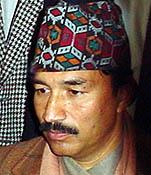 Home Minister Kamal Thapa has set himself apart from the rest of King Gyanendra's ministers. Given the current political climate in the country, Thapa's portfolio was bound to catapult him to prominence (critics would say controversy).
Home Minister Kamal Thapa has set himself apart from the rest of King Gyanendra's ministers. Given the current political climate in the country, Thapa's portfolio was bound to catapult him to prominence (critics would say controversy).But it is the man Maila Baje is impressed by. By announcing that his faction of the Rastriya Prajatantra Party was "royalist" and inviting Marich Man Singh Shrestha and all of his living predecessors as Panchayat prime minister to join the party, Thapa brought honesty in one critical aspect of Nepalese politics. (Maila Baje cannot fathom why former panchas studiously refuse to acknowledge their association with the Panchayat system.)
A few days ago, Thapa accused some media houses of being remote-controlled from abroad and said the facts would emerge soon. (Cross-referencing particular bylines with particular stories in particular publications would be enough for that.)
Thapa, indeed, is a product of the partyless system. As president of the Rastrabadi Swatantra Bidyarthi Mandal, Maila Baje found in him an eloquent exponent of the values of nationalism and discipline.
Today, that organization lives in our collective memory as an adjective describing the excesses of Panchayati zeal. No doubt, mandales used violence and other forms of intimidation to vanquish their foes. Just as members of Congress's Nepal Students Union and the assortment of Akhils owing allegiance to different communist factions have done.
For those familiar with the Mandal's broader activities – symposiums, quiz contests, debates, among other things – the denunciation and denigration are unjust. The banning of the organization – a demand of student protesters King Birendra agreed to before announcing the referendum in 1979 – prevented pro-Panchayat students with a forum during the following decade.
Among the handful of younger Nepalis set apart as prime ministerial material, the names Maila Baje most frequently came across were those of Sher Bahadur Deuba and Kamal Thapa.
The first has already risen to the office three times. Despite his fall (all three in highly charged circumstances), Maila Baje believes Deuba still retains the resiliency of consensus to become head of the government again.
Maila Baje is eager to see Kamal Thapa as prime minister. After he lost the first direct election to the Rastriya Panchayat in 1981, the press had a field day mocking how even a power blackout sponsored by the high and might couldn't save Thapa's candidacy. His understudies occupied prominent cabinet positions, but that's the nature of the game.
Defeated, but unbroken, Thapa went on to head Nepal Youth Organization. During his tenure, the United Nations observed International Youth Year. Thapa drew up and oversaw programs in Nepal very effectively.
After he won a Rastriya Panchayat seat in the 1986 election from his Makwanpur constituency, Thapa was spotted, together with a few other victors, descending the steps of Manakamana daubed in red. Thapa was among the very few Panchayat ministers who maintained a library.
Should his faction of the RPP emerge dominant in the weeks and months ahead, the onetime captain of Nepal's national football team will have positioned himself as a frontrunner for the premiership. Controversy – often merciless -- will no doubt continue to dog him. But, then, Kamal Thapa probably recognizes better than anyone else that that's where he excels.